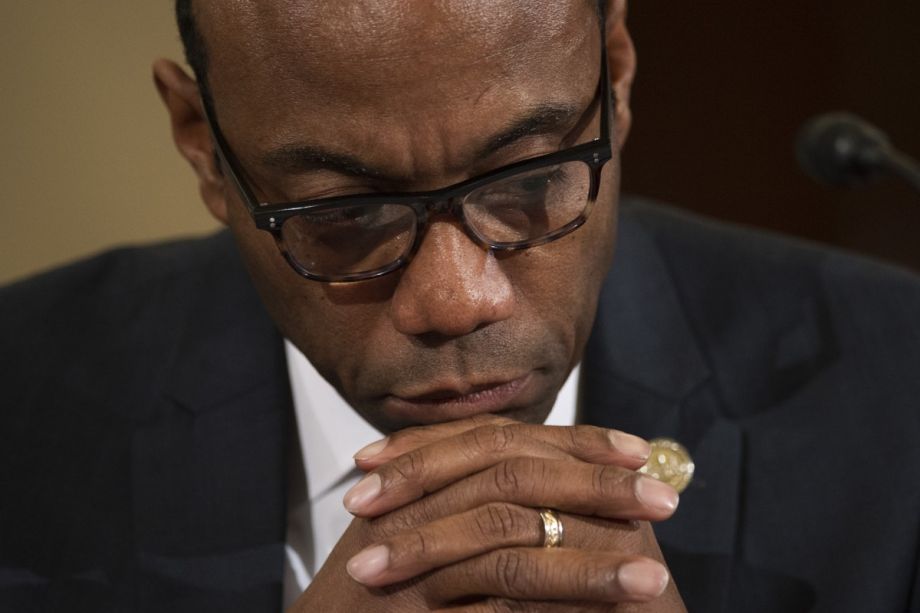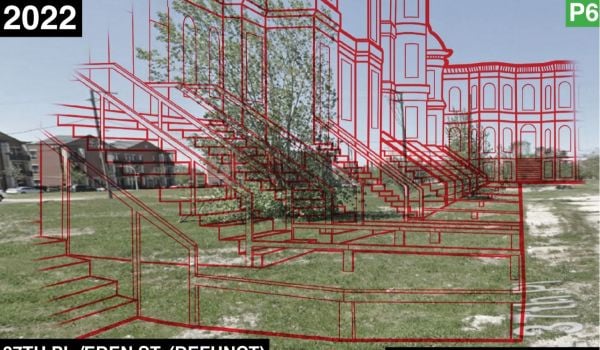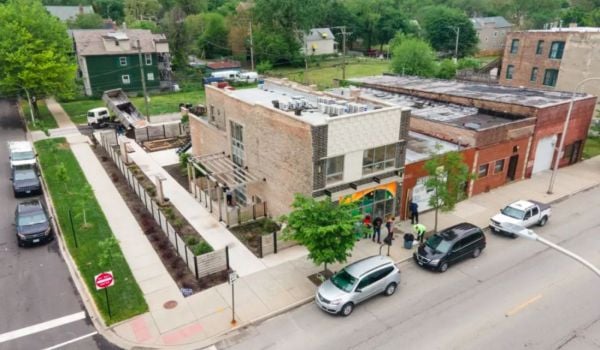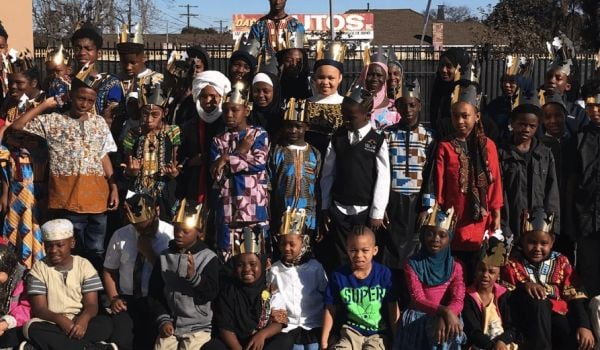Cornell Brooks is three years into leading the nation’s oldest and largest grassroots-based civil rights organization, the National Association for the Advancement of Colored People (NAACP). We spoke recently about the work the NAACP is doing in the wake of the presidential election, his thoughts on Trump’s Cabinet picks and the national racial climate.
You’ve been putting yourself on the front lines of protest, most recently being arrested in the U.S. Senate Office of Alabama Senator Jeff Sessions, for objecting to his nomination to lead the Department of Justice. Why is this activism important to you and your organization, and what do you hope to achieve?
I would note here that many people took the sit-in against Senator Sessions as the first, or one of the first, acts of civil disobedience in direct action against not merely a nomination, but this administration’s policy.
And when we say that, we don’t mean it in any way partisan — we’re very, very policy specific. So in other words, where the president calls for a draconian and Nixonian turn, the expansion of law and order, when he blesses and indicates federal encouragement for the expansion of a constitutionally wrong-headed, morally wrong policy of stop and frisk, proven to be, at least through a federal district court, racially discriminatory and constitutionally violative, we have to take a position against that. So we choose old school tools in new ways.
This was not without risk. So in other words, getting caught, fingerprinted, booked, being subject to 90 days in jail and a significant fine, and having one’s professional and personal reputation broadcast in ways that are deleterious and damaging is not anything anybody can take lightly. I practiced law for many years. I represented the United States as a trial attorney in the Department of Justice. I signed briefs and complaints, where beneath my name was “on behalf of the United States.” I do not take breaking the law lightly. But we had to.
President Trump and HUD Secretary-Designate Ben Carson have vowed to end former President Obama’s signature fair housing policy aimed at reducing housing segregation and combating discriminatory housing practices — the Affirmatively Furthering Fair Housing rule. Will the NAACP fight the rollback?
Absolutely. It is a longstanding principle of the law that HUD and the government have a responsibility to affirmably further fair housing. Now, where we have rampant housing discrimination in the market, we need affirmative tools to address it.
For example, the foreclosure prices, the mortgage prices, what did we see? We saw subprime lenders convincing middle-class African-Americans, middle-class Latinos with prime credit to take subprime loans. Was this a matter of gullibility? No. This was a matter of discrimination. And so, it is ironic in the extreme, that next year, in 2018, the Fair Housing Act will be 50 years old. When was it passed? It was passed within a week of Martin Luther King being assassinated. So wouldn’t it be perversely ironic that on the eve of the anniversary of the Fair Housing Act, which was literally passed in the blood of Martin Luther King, for this president and his nominee, Dr. Ben Carson to roll back a pillar of fair housing in the country.
So short answer to your question, if they do it or attempt to do it, again not a threat, but a prediction and a promise, the NAACP — in its 2,200 units in 50 states, military installations, Native American reservations, colleges, high schools, every large city in the country, hundreds and hundreds of small towns — we will respond with unrelenting pressure. This is something the administration should reconsider.
We’re living in what is termed, “the century of cities.” How does the “NAACP Strategic Plan: Game Changers for the 21st Century” address inequality, especially in cities?
We are at the moment in this country where we have an opportunity to take the places that are often bearing the brunt of inequality, where you see the most pronounced disparities of wealth and race, and make them oases of opportunity. That means using our game changers. Here’s what it means: It’s hard to revitalize cities if you have dysfunctional police departments and unsafe neighborhoods. It’s hard to revitalize cities when there’s a chasm of trust between police department and the citizenry. And so our game changers, with respect to addressing policing, community policing, doing something about body cameras, passing the Law Enforcement and Integrity Act and the Inter-racial Profiling Act, cleaning our police departments of the most implicit, bias, but also de-escalation of force.
When we look at our economic opportunity or economic development work, one of the things that we are focusing on right now, is what we call our social covenant bonds, which is work that I started at the New Jersey Institute of Social Justice in my second hometown, Newark, New Jersey, which is a tool used to leverage procurement, leverage employment in cities.
These are the sorts of things that the NAACP does, not back in Washington, but in literally in every hometown near you. And we’re doing them in the place where they count the most — in cities. Right?
When we met almost a decade ago, when you were a fellow at Leadership New Jersey and leading the Newark-based New Jersey Institute for Social Justice, you successfully fought for “ban the box” and prisoner re-entry legislation which the New York Times hailed as “a model for the rest of the nation.” Have these laws produced the changes you had intended?
Yes and no. For companies that are not hell bent on discriminating, yes. For companies that are intent on being surreptitious on civil rights laws, no. What we’ve seen is some companies use “ban the box” to categorically deny, based on presumption and function, people the opportunity to compete for work. Now does that mean “ban the box” laws don’t work? Here’s what it means. Some studies that suggest that when you postpone the criminal background inquiry into later in the process, which is exactly what the federal government does every day to great benefit and no detriments, some companies will simply say African-American and Latino men, because they may have a criminal background, let’s weave them out of the process all together. Now, as a former civil rights practicing lawyer, that’s a great way to find yourself at the back end of a lawsuit. Those are the facts, and it’s only a matter of time before some of these companies wake up in the back end of a multimillion-dollar class-action suit with great reputational damage and market impact, that they come to the realization, be fair, be reasonable, hire the best people, screen out incompetent, screen out people who don’t have the willingness to work, use an inclusive standard, hire the best people, but don’t discriminate. That’s exactly what we do at the NAACP. We’re tough, we only hire the top 5 percent, but we’ll hire diversity. And that means that if someone has a criminal background, not related to the work, and they can do the job, and qualify for the job, we hire. And if they’re not, we don’t. That’s all we ask.
And do you see the actual changes in places like Newark and others that have adopted these forms of legislation?
You know, I think it’s too early to tell. I’ll say this: The companies like Walmart, Target, John Hopkins Medical Center, companies that have adopted ban-the-box policies and who are subject to ban-the-box laws and are using them effectively, say that they get better people. We passed the ban-the-box law in New Jersey based upon the work of John Hopkins University. We consulted with them, we had their VP of Human Resources talking to New Jersey business people about working with people with criminal records. And what did they say? They say that the absentee rate is lower. Job performance, higher. The work ethic that people bring to work, greater. Among those people with criminal records, because they’re happy to have a job. And I met with those folks only a week or so ago and they’re still engaged with this work. The point being here is that the companies that do use the policy the way it’s supposed to be used, it helps.
The NAACP has a clear mission to ensure political, educational, social and economic equality of rights of all persons and to eliminate race-based discrimination. What do you see as the biggest challenge to achieving this mission?
The largest challenge would have to be the disenfranchisement of Americans of color and varying ethnicity and generation in the wake of the election and reelection of the nation’s first African-American president. We are in a perversely ironic moment that you have this multiracial, multiethnic, multigenerational coalition of Americans who elected Barack Obama as president. And in the wake of that, we’ve seen a generationally unprecedented, and Machiavellian frenzy of voter disenfranchisement.
We saw in Texas, a state legislature pass a bill which meant that an ID that empowers you and enables you to carry a concealed weapon was deemed to be sufficient civic and democratic proof to vote, but an ID that allows you to carry a book of chemistry, a book of engineering, a book of English, was deemed to be insufficient civic and democratic proof to vote. And that imperiled 630,000 votes in Texas. Similar voter ID laws were passed in Alabama imperiling 500,000 votes. A similar ID law was passed in the state of North Carolina imperiling the votes of 5 percent of the election. And all across the country we’ve had politicians admit aloud and in broad daylight that they’re doing this to maintain partisan advantage using racially discriminatory and generationally disadvantageous tools. So you move voting booths off of college campuses, move voter registration off of college campuses, decline to honor college and high school IDs, pass onerous, restrictive, racially discriminatory voter ID laws where you know one out of every 10 eligible American voters does not have a government issued photo ID. One out of every four African-Americans does not have a government issued photo ID. And, where we know for a fact that it is not necessary. So in other words, we have people using the myth of voter fraud as pretext and an excuse for voter suppression. It’s not right. The studies make it clear to us that out of 1 billion ballots cast there were little more than 30 instances of voter fraud. So here we have, after the election and reelection of President Obama, this frenzy of voter suppression across the country. And what has the NAACP done? We’ve gone to court and in 10 cases, in 10 months, we won, in conservative courts.
And so we believe that fighting voter suppression is a number one issue. Today you have a diverse, millennial-majority electorate that understands that diversity is not a gauzy ideal; it is the multicolored reality in which we live. Those folks support government that is accountable, government that is transparent, government that respects civil liberty and civil rights to the citizenry. And we got a set of politicians in this country that were faced with a choice. The choice is to persuade or cheat, and some of them have chosen manifestly to cheat. So that’s our number one issue. In other words, it’s hard to get criminal justice reform, if the people can’t vote. It’s hard to get immigration reform if the people can’t vote. It’s hard to protect the rights of the members of the LGBT community if you don’t have access to the vote.
And last one on this, Tom, is quite simply this: People within and without the ranks of the NAACP have literally died.
When I walk into the headquarters of the NAACP in Baltimore, I have to walk past the bronze bust of a black man by the name of Medgar Evers who laid down his life for the right to vote in Alabama — where we got arrested, booked, fingerprinted and cuffed, not comfortably. Viola Liuzzo, an Italian housewife from Detroit, lost her life. Reverend James Reeb lost his life for the vote. Jonathan Daniels, a young seminarian, lost his life for the right to vote. Jimmy Lee Jackson, young African-American and a veteran, lost his life for the right to vote. Martyrs for the vote. So how is it in the name of God, in 2017, that we have politicians, walking around, mouthing the myth of voter fraud, doing nothing about voter suppression.
They give medals, acknowledging the legacy of the past, while denying the reality of the present. Absolutely shameful.
And to have the President threaten last week a voter suppressive executive order, which then put us in the position to remind him, Dear Mr. President, if you issue an executive order, it will be met with unrelenting resistance.
And of course the media asks, was that a threat? Not a threat — a prediction and a promise. It’s got to be the number one issue.
It’s impressive that you consider yourself “an heir” of the Brown v. Board of Education decision. Do you have a concern that new Supreme Court appointees nominated by President Trump will endanger that legacy?
I’m concerned. I’m concerned because when I say I’m “an heir,” I mean I am among the youngest of the baby boomer generation and among the oldest of the hip hop generation. So being born too young to remember the civil rights movement, except for history books, but going to segregated schools, integrated schools, being in the first or second class of Head Start, and ending up at Boston University, Yale Law School and HBCU Jackson State University. I’ve benefited from all of those opportunities. I’ve benefited from those Brown v. Board opportunities, and my parents and grandparents legacy of hard work, drive, ambition — all the things that people teach you in Sunday school or on Shabbat — so I get that. But the things your parents teach you only work if you got an opportunity to use them. That means unsegregated doors of opportunity. Segregation is a restraint on competitiveness; it’s a constraint on meritocracy.
Here’s what I know, W.E.B. DuBois pursued his PhD in sociology being the first African-American to graduate from Harvard with a PhD. Why? Because Harvard University, at the turn of the century decided that it did not want to be a finishing school for well-heeled gentlemen from New England, and the president of the university decided to reach out and extent opportunity to people from across the country, including people from the South. So W.E.B. DuBois though he was from Great Barrington, Massachusetts, was going to school at Fisk, and they created an outreach if you will, to recruit more people to Harvard. It’s a meritocracy, when women, people of color, people from diverse backgrounds, people with different sounding names, or names that would be perceived to be different sounding, when they enter the pool, it’s more competitive. It’s more of a meritocracy. That’s what this country is about.
And so, I’m concerned about any slippage in terms of a commitment to integration. Integration is not just a quaint notion from the past, integration is about modern-day America. Because when we talk about having a globally competitive workforce, that’s just another way of saying integration in the market. Integration in our schools. Integration in the workplace. And that requires intentionality. It doesn’t just happen. And so, we’re concerned about that, we’re looking at (Supreme Court nominee) Gorsuch’s cases, his records, his jurisprudence, his character. We take it seriously. The NAACP is the organization that’s probably won more cases before the Supreme Court than anyone, any organization. We take every seat on the Supreme Court seriously. We’re currently vetting the record of Judge Gorsuch and we will see.

Tom was president, CEO and publisher of Next City from May 2015 until April 2018. Before joining Next City, he directed the Center for Resilient Design at the College of Architecture and Design at the New Jersey Institute of Technology. Prior to that, he ran the Regional Plan Association’s New Jersey office, and served as a senior adviser on land use for two New Jersey governors. Tom is a licensed professional planner, and a member of the American Institute of Certified Planners, as well as an adjunct professor at the New Jersey Institute of Technology, where he teaches land use planning and infrastructure planning.

















